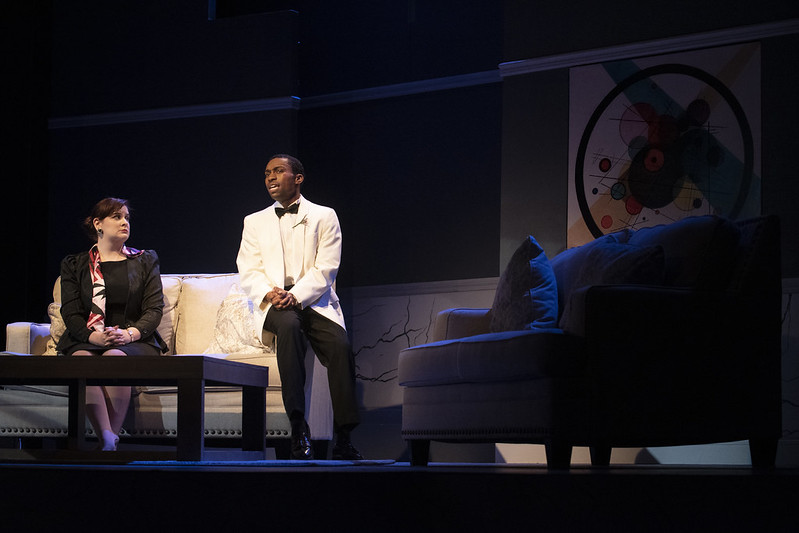Jordan Tudor Haggard & Tyler Tate. Photo: Tom Fougerousse/UofL
Six Degrees of Separation
By John Guare
Directed by Geoffrey Nelson
A review by Keith Waits
Entire contents are copyright © 2020 by Keith Waits. All rights reserved.
The inclusion of John Guare’s play in the University of Louisville Department of Theatre Arts’ “Season of Black Plays” may seem dubious in comparison to August Wilson’s King Hedley II or Dominique Morriseau’s Detroit ’67, stories populated by Black characters and concerning themselves with African American history and culture. Guare picks up the true story of one young man of color and uses it as a lens to examine the patronizing gaze of white privilege.
Paul (Tyler Tate), a young black man, interrupts pre-dinner drinks in the Central Park apartment of Ouisa (Jordan Tudor Haggard) and Flan (Zachary Stone) who are working to finagle a $2 million investment from Geoffrey (Cody King). He tells a tale of being mugged in the park and claims to be Harvard classmates of the couple’s children. He charms the group so thoroughly with a smooth, facile erudition and seals the deal by letting it slip that his father is iconic screen legend, Sidney Poitier.
All is not as it seems, however, and Paul leaves a trail of misunderstanding that will lead to tragedy. Even as their awareness of the truth grows, Flan, and especially Oiusa cannot help but be in his thrall.
The key role is Ouisa, and Jordan Tudor Haggard paints a delicious and light-hearted portrait of a narcissistic society doyenne but also forges a core of vulnerability and compassion that makes sense of her attachment to Paul. Flan is as lacking in substance as the name suggests, and Zachary Stone occupies the tailored suits with appropriate fatuousness. Tyler Tate perfectly captures the combination of the anxious energy and the silken surface of Paul and forces us to feel the same affection that Oiusa feels.
The rest of the cast does fine work, but Manuel Viveros has a brief, explosive moment of comic confrontation that is the fulcrum of the narrative. It is the kind of cameo that demands go-for-broke energy, and Viveros makes the most of it.
The design work is exemplary, but the set by Jerome L. Willis and Megan Meyer dominates almost like another character, with scalloped projections high above hard marbled surfaces, soft furnishings and double-sided abstract painting that is a tidy, if not overly neat, a metaphor for the mind of the play.
Six Degrees of Separation isn’t interested in the experience of Black Americans as much as how privileged Whites of the elite upper class view them. Their reaction to Paul is entirely self-serving and arrogant, and the vain satisfaction is cocktail party liberalism in full bloom. Yet Guare builds the complexity of the interaction until we are not certain of how to feel, and that thoughtfulness follows us out of the theatre with questions about our own role in such encounters.
Six Degrees of Separation
February 21-29, 2020
University of Louisville Dept. of Theater Arts
U of L Playhouse
1911 South Third Street
Louisville, KY 40292
louisville.edu/theatrearts
Keith Waits is a native of Louisville who works at Louisville Visual Art during the days, including being the host of LVA’s Artebella On The Radio on WXOX 97.1 FM / ARTxFM.com, but spends most of his evenings indulging his taste for theatre, music and visual arts. His work has appeared in LEO Weekly, Pure Uncut Candy, TheatreLouisville, and Louisville Mojo. He is now Managing Editor for Arts-Louisville.com.
2020 Arts-Louisville/Broadway World Theatre Award Sponsorship provided by






